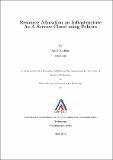Please use this identifier to cite or link to this item:
http://drsr.daiict.ac.in//handle/123456789/306| Title: | Resource allocation on infrastructure as a service cloud using policies |
| Authors: | Divakaran, Srikrishnan Nathani, Amit |
| Keywords: | Service-oriented architecture Computer science Web services Cloud computing Electronic data processing Distributed processing nformation technology Management Information resources management Composite web services Resource allocation Scheduling Adoption of cloud computing Utility computing |
| Issue Date: | 2010 |
| Publisher: | Dhirubhai Ambani Institute of Information and Communication Technology |
| Citation: | Nathani, Amit (2010). Resource allocation on infrastructure as a service cloud using policies. Dhirubhai Ambani Institute of Information and Communication Technology, ix, 60 p. (Acc.No: T00269) |
| Abstract: | Conventionally, a cloud refers to an Infrastructure as a service cloud. Infrastructure as a service cloud providers manage a large set of computing resources. These resources can be provided to cloud users on demand in the form of virtual machines. Cloud consumers do not need to manage resources and be worried about the performance issues because they are handled by cloud providers. Resource allocation in the context of infrastructure as a service cloud means allocating virtual resources namely computing capacity, storage etc. to competing requests based on pre-defined resource allocation policies. In real world most of the Infrastructure as a service clouds rely on simple resource allocation policies like immediate and best effort. Immediate means the resources are allocated if they are available or the request is rejected and best effort means the requested resources are allocated if they are available or the request is placed in first come first serve queue. Sometimes it is not possible for a cloud provider to satisfy all the requests which come to them immediately because of lack of resources. In this case cloud providers can benefit from more complex resource allocation policies. Haizea is a resource lease manager that tries to address above issues. It uses resource leases as resource allocation abstraction and implements these leases as virtual machines. Currently, it supports four kinds of resource allocation policies: immediate, best-effort, advance reservation and deadline sensitive. The aim of thesis is to extend the current scheduling algorithm of Haizea to support deadline leases in an efficient manner. A dynamic planning based scheduling algorithm is proposed which will admit new leases and prepare the schedule whenever a new lease can be accommodated. The proposed algorithm is implemented in Haizea. Experiments are performed to demonstrate the effectiveness of it. The results show that it maximizes resource utilization and acceptance of leases compared to the existing algorithm of Haizea. |
| URI: | http://drsr.daiict.ac.in/handle/123456789/306 |
| Appears in Collections: | M Tech Dissertations |
Files in This Item:
| File | Description | Size | Format | |
|---|---|---|---|---|
| 200811036.pdf Restricted Access | 760.15 kB | Adobe PDF |  View/Open Request a copy |
Items in DSpace are protected by copyright, with all rights reserved, unless otherwise indicated.
